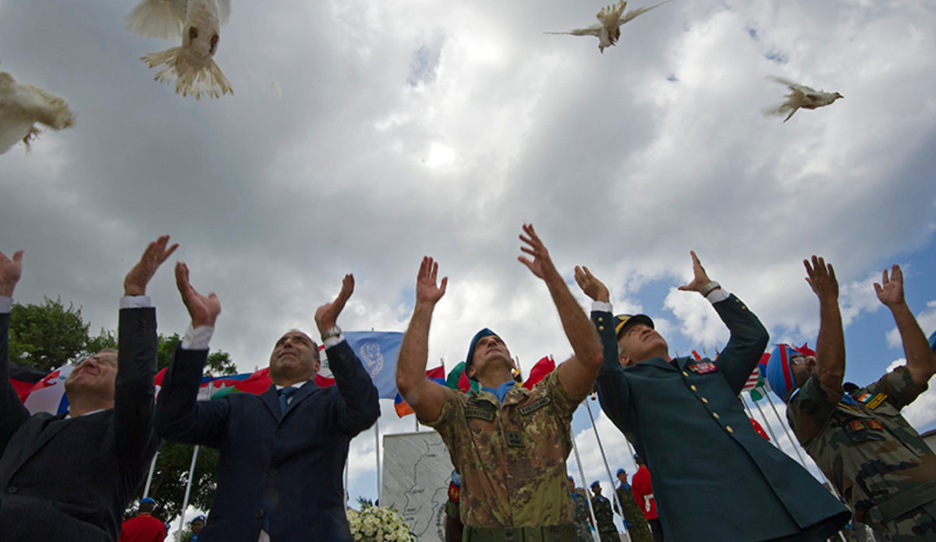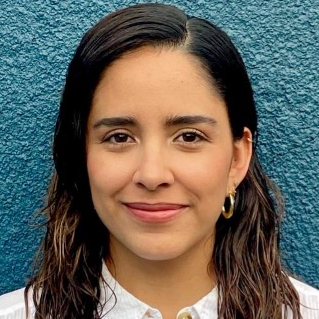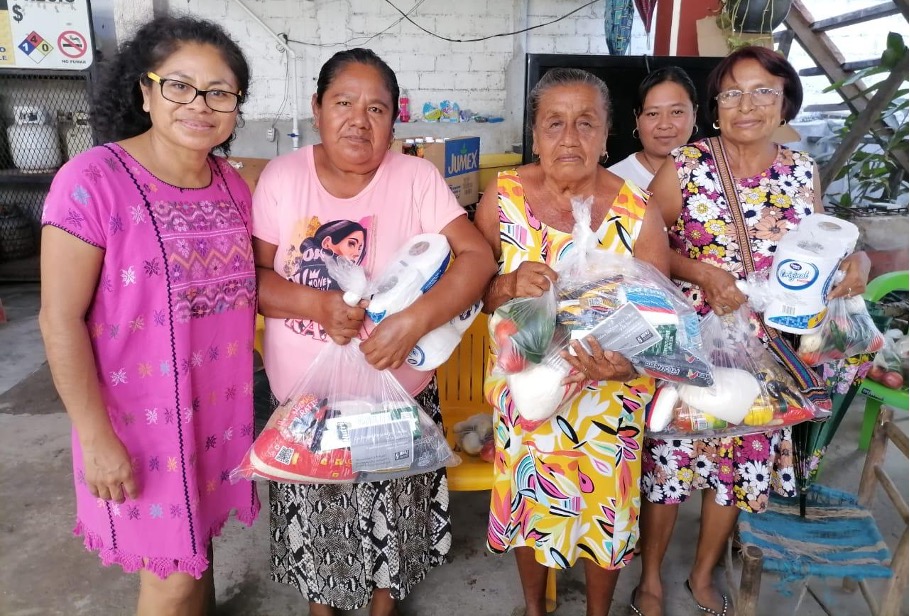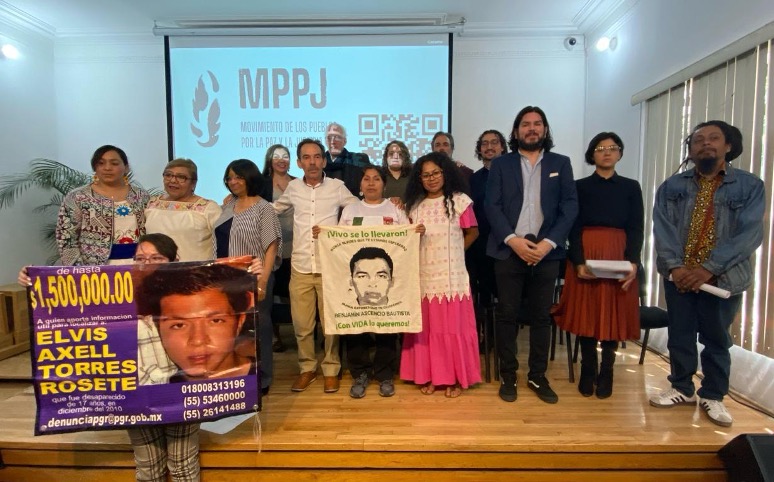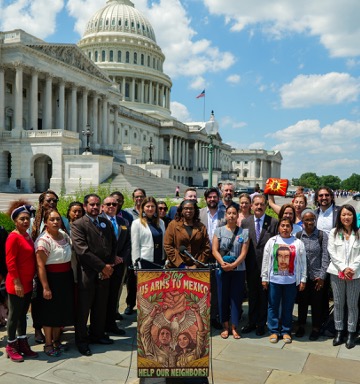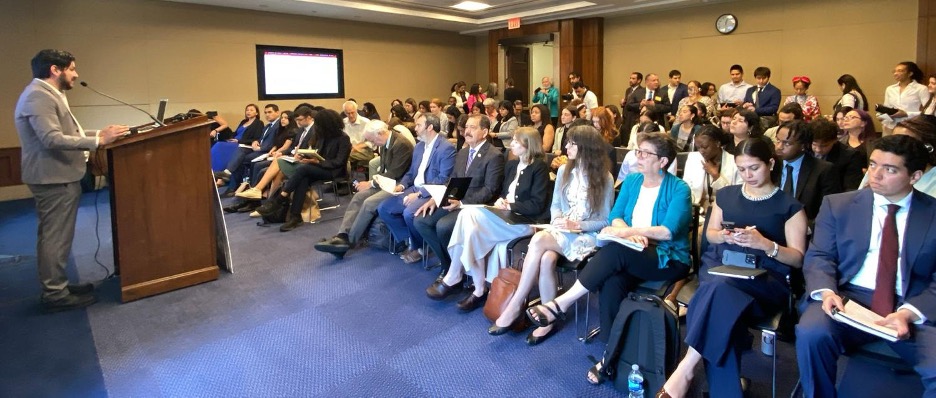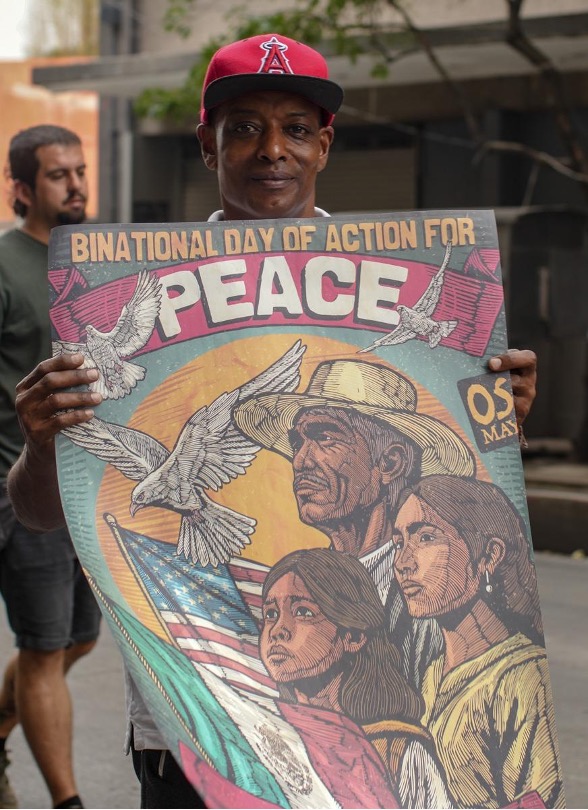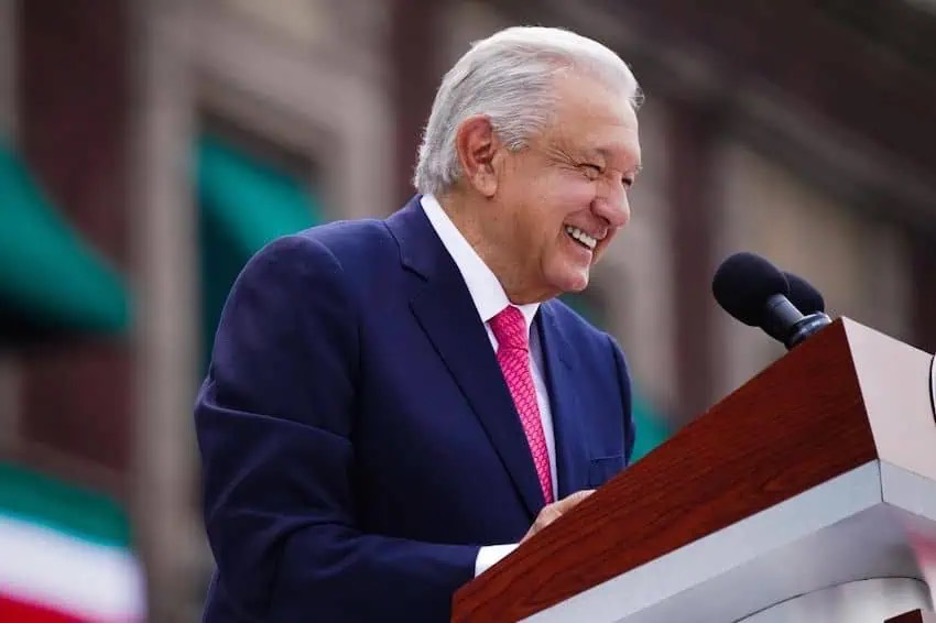|
|
The weekly newsletter of the Mexico Solidarity Project |
|
Every issue archived online at mexicosolidarityproject.org |
|
October 02, 2024 |
|
|
|
The Key Ingredient for Nurturing Peace |
|
Meizhu Lui, for the editorial team |
|
International Day of Living Together in Peace: Photo from Eva Maria Fernandes in Indus Scrolls |
|
Like other species, humans often fight to the death: for territory to hunt and settle in, for food to feed ourselves and our young, for partners to mate with. But today, humans have the expertise to kill at a level that threatens life itself. There’s no safe place. An atomic bomb incinerates you, a drone picks you off with precision, or a pager in your pocket explodes away your existence.
The human toll — the deaths, the pain of separation and constant fear shared by the people of Mexico and the US — is exacted by a mafia culture shrugging indifferently when millions of lives are sacrificed to make a few people rich. Our governments point to cartel violence with horror — and hypocrisy. The drug gangs mirror our own governments’ values and actions.
What if the relationship between our two countries wasn’t based on money, but on the people’s well-being? What if all the energy and creativity directed to developing bigger and badder weapons and multiplying police forces was channeled toward structures, technologies, and instruments of peace?
Our guest this week, Elena Gutierrez, works to make that shift happen. The binational People’s Movement for Peace and Justice (Movimiento Popular por la Paz y la Justicia) found that the best weapon we have … no, stop! Enough of war images and analogies! As a woman who loves to cook, let me say “the best ingredient we have …” As a mother, let me say, “the best way we can nurture …..”
.… peace is is to bring people together, breaking bread and filling tortillas, sharing heartbreak and hope. Peace comes when we recognize our common humanity. Let’s blend our voices and, as the old spiritual preaches, “Put down our swords and shields and study war no more.” |
|
For a deeper dive into current news and analysis in English, check out our media website. And definitely see the new English podcast ¡Soberanía! (Sovereignty) with José Luis Granados Ceja and Kurt Hackbarth. They entertain, while dismantling the lies and distortions about Mexico fed to us by the mainstream media. |
|
Two Peoples Acting for Peace with Justice |
|
Elena Gutierrez has been an activist for more than 15 years, engaged in community development work in Mexico City and in Indigenous and rural communities in Mexico. She’s worked on land defense, access to water, communal justice, and in campaigns to create consciousness around immigration issues in Mexico and the US. Now she coordinates the activities of the binational People’s Movement for Peace and Justice at the US-based organization, Global Exchange.
All photos: Elena Gutierrez |
|
|
What led you to your work today, facilitating the binational People’s Movement for Peace and Justice?
I was raised in a political family. When I was a kid, my favorite aunt was involved in the Zapatista uprising of 1994. In 1999, my older sister went on strike at UNAM to demand that public universities be tuition-free. They won! Later, I personally benefited from their victory. Still later, I became a migrant to the US, so I got to know firsthand how difficult it is to migrate and how immigrant communities in the US are struggling.
Global Exchange works on international solidarity. Why did it decide to focus just on Mexico for a peace project?
Global Exchange has relationships with many countries. But ever since the Zapatista uprising, our organization’s leaders have had strong ties to Mexico. After all, we share a border, a history — and a border history! It goes back to 1848, when the US annexed almost half of Mexico into what’s now the US Southwest, creating human rights issues dragging on into the present day. Our unequal relationship still divides the two countries and also Mexican-American communities in what’s now the US.
Today, the border is a major issue in the 2024 US presidential election, particularly so because Mexico is a filter for all the Latin Americans passing north through Mexico to the US, and for the US guns that pass south through Mexico into Latin America. |
|
|
Afro-descendants in Guerrero, MX |
|
In the long history of US-Mexico government and business relationships, people aren’t important. Money is! This has damaged the environment, displaced Mexicans to the point of crisis, and provoked more and more armed violence, taking us farther and farther from our dreams of peace. |
|
The project’s first big event was the Summit in Mexico City in February 2023. What was accomplished?
We began preparing for the Summit in 2022 by bringing together 70 US and Mexican grassroots organizations. At meetings in various locations, they gathered input, proposals and demands. The goal was to propose a new Mexico-US relationship based on principles of peace, justice and human rights instead of money.
Out of that yearlong process, at the Summit in 2023, we formed the People’s Movement for Peace for Justice (MPPJ) and developed a ten-point Binational Agenda. People organized themselves by their main issues: marginalization of Indigenous people, criminalization of Afro-descendants, relatives of the disappeared, victims of gun violence, exploited workers, migrants.
Those who came to Mexico City included the parents of the 43 students who disappeared from Ayotzinapa school; US parents whose children were shot in school in Parkland, Florida; Black Lives Matter leaders whose communities are continually targeted for police violence, Afro-Mexican fishers whose waters are being contaminated, and workers threatened by the corrupt CTM union for trying to organize democratic unions. |
|
|
Press conference in Washington DC |
|
The Agenda calls for a stop to the proliferation of guns in the US and their uncontrolled flow to Mexico; a public health approach to drug use; a binational strategy to search for the disappeared; and legislation in both Mexico and the US to protect Indigenous peoples’ land rights. Afro-descendants demanded ending structures of racism and respect for their cultures; migrant participants asked for protection, not punishment. The agenda calls for attention to the root causes of displacement — hunger, violence, environmental damage — and for strategies developed by both governments and civil society, including organizations like those in the MPPJ.
The MPPJ agenda was presented to government officials in both countries. How was it received?
Delegates from both countries participated in the talks with Mexican legislators in Mexico City and with US legislators in Washington, DC. We focused our testimonies on gun violence because we found that the constant presence of guns was a condition facing all the groups in the MPPJ. Guns are responsible for the fear that so many live with daily: in the US. Native Americans face down armed military agents coming into their reservations; border agents, police, and predators kill migrants in Mexico, on the border, and in the US; US police kill Afro-descendants. Guns enjoy greater freedom than people! |
|
|
"Stop US Arms to Mexico" outside the US Capitol. |
|
We emphasized that the two countries have different pieces of the problems and will have different roles in solving them. For example, fentanyl. Mexico is the producer, the US the consumer. Guns: US companies produce and sell the weapons, and they are then smuggled into Mexico. People in the US fear mass shootings; Mexicans fear cartel violence. Clearly, it will take binational action to solve these problems. |
|
At the Washington DC event, a parent from Uvalde, Texas and a parent from Ayotzinapa, whose children were killed by the same kinds of guns, testified. It was so moving to hear their stories and to see them hug after their stories; we were all crying.
Our most important recommendation is to create a binational Commission for Human Rights. We must see all these issues through a human rights lens. |
|
|
Congressional briefing, Washington DC |
|
Will the US and Mexico act on our Agenda? In Mexico, we feel we can work with the new government of Claudia Sheinbaum, who will take office on October 1. We don’t know yet what the US election will bring, but we have champions such as Texas Congressman Joaquin Castro. Our hope is that Congresspeople from both countries will work together for peace.
The MPPJ has decided to shift its focus this year to USMCA reform, scheduled for 2025. Why trade policy reform?
Since the passage of NAFTA in 1994 — which brings me back to the Zapatista uprising against NAFTA and my own introduction to politics! — inequality both between Mexico and the US and within each country has widened. Big transnational companies have acquired land and natural resources, exploiting workers and generating poverty, displacement, migration and violence. |
|
|
MPPJ was at the Cinco de Mayo march in Mexico City, 2024 |
|
Instead of trade agreements that prioritize the commercial interests of gunmakers, mining and agricultural corporations, the people need trade reforms that prioritize environmental and labor protections.
The MPPJ brought people together, and that made all of us recognize that we’re not alone. We learned that solidarity has no borders — whether between countries, races, genders or issues. We are one as human beings with the same desires for peace, justice, and the protection of our planet for the generations to come. And we can make it happen. |
|
|
|
|
AMLO'S Final State of the Nation Report |
|
Translation by Pedro Gellert |
|
On September 1, 2024, President Andrés Manuel Lopez Obrador delivered his final State of the Nation Report in the zocalo filled with 280,000 emotional supporters. We excerpt the beginning of his speech which explains why he called his agenda the “Fourth Transformation.” |
|
|
Mexico's president giving his sixth and final report to the nation. (Presidencia/Cuartoscuro) |
|
My friends:
Today I will be delivering before you and before the people and the nation my final State of the Nation Report, and I do so more convinced than ever that the best of Mexico is its people, heirs to civilizations that flourished long before the arrival of the European invaders.
Thanks to the roots of those pre-Hispanic cultures, of that deep Mexico, the Mexicans of today are, in their vast majority, honest and solidarity-minded workers. The legacy of good principles that were transmitted from generation to generation and that have not disappeared despite oppression, classism, and racism is what distinguishes us and defines us as a country of virtues and greatness. Mexico’s unique and splendid political history also stems from this root and trunk.
Let us not forget that the fathers of our homeland — Hidalgo and Morelos — not only fought for independence, but also for the abolition of slavery and against inequality. (Ed: the First Transformation, which overthrew Spanish rule)
Juarez established the secular state. (Ed: the Second Transformation)
And between 1910 and 1917, our country was the protagonist of the first social revolution of the 20th century. Here, the Flores brothers fought for workers’ rights. Here, the revolutionary hero of the people, Francisco Villa, and the most authentic defender of the peasants, Emiliano Zapata, took up arms to demand freedom, land, and justice. (Ed: the Third Transformation)
…..We are heirs of a grandiose past and of an exceptional and fruitful history. This heritage explains why it did not take us long to reverse the betrayal of our revolutions by neoliberal economic or porfirista autocratic political policies (Ed. The dictator Porfirio Diaz ruled for 28 years), and how we were able, relatively rapidly, to lay the foundations to initiate a new stage that is already known and identified as the Fourth Transformation of Mexico’s public life.
…We learned what Hidalgo said more than 200 years ago, that the only god of the oligarchs was money.
We learned about the Sentiments of the Nation, the words of Morelos, who recommended raising the peon’s salary and educating the peasant’s son just like the son of the richest landowner, and proposed the creation of courts to protect the weak from the abuses committed by the powerful.
We learned by heart the wise words of Juarez — tell me if this isn’t true — that with the people, everything; without the people, nothing.
We follow the slogan of Ricardo Flores Magón, that only the people can save the people.
We do not forget when Zapata was offered a ranch, a large estate, and he answered that he had not entered the Revolution to become a landowner.
We heard that the straightforward Villa was of the opinion that the country should be governed by someone who really loved his people and his land, and who would share its wealth and progress.
How could we ignore the slogan of the Apostle of Democracy, Francisco I. Madero: effective suffrage, no reelection; or the declaration of Lázaro Cárdenas, according to which a government or individual who hands over natural resources to foreign companies betrays the homeland.
With this ideology, we began our government almost six years ago. On February 5th of this year, we presented 20 constitutional reform proposals to Congress to restore to the Magna Carta the revolutionary and popular character it had in its original drafting in 1917.
…There is an urgent need to separate economic power from political power and for the government to represent everyone, rich and poor, country people and city people, believers and non-believers. We need, and we must not forget this, we need to continue with this policy of achieving an authentic democracy, not a simulation, not an oligarchy with a façade of democracy, true democracy, the power of the people.
We want kratos with demos. Democracy is made up of two parts: demos is people, kratos is power, democracy is the power of the people; what the oligarchs want is kratos without demos, they want power without the people. To hell with that!
We have upheld and proven the principle that, for the good of all, the poor come first.
Let’s remember that life is too short to waste it on things that are not worth it, and let us never, ever forget that happiness does not reside in money, in material possessions, in titles or fame, or in the quest for power for power’s sake. Happiness is being at peace with oneself, with one’s conscience, and with one’s fellow men and women.
And finally, thank you. Thank you from the bottom of my heart.
Long live the people!
Long live Mexico!
Long live Mexico!
Long live Mexico! |
|
|
|
|
Recent news reports and commentaries, from progressive and mainstream media, |
|
Hilary Goodfriend, The Democrats Want a Bigger, More Beautiful Border Wall Jacobin. Donald Trump’s cruel border policies sparked an outpouring of popular compassion for migrants, which Democrats made central to their 2020 platform. Now the Biden administration and the Kamala Harris campaign have embraced Trump’s xenophobic premises.
Pese a turbulencias en sindicatos, SME incorpora a mil empleados al Sistema de Compensación Vitalicia Vanguardia. El Instituto para Devolverle al Pueblo lo Robado (Indep) estima incorporar a mil 350 trabajadores del Sindicato Mexicano de Electricistas (SME) al Sistema de Compensación Vitalicia.
Eric Martin, AMLO seizes U.S.-owned port in final week as Mexico's leader Financial Post. President Andres Manuel Lopez Obrador’s administration declared the land containing a port and quarry south of the resort cities of Cancun and Playa del Carmen a natural protected area, according to a filing in the federal gazette published hours after U.S. lawmakers sought to dissuade such a move.
Julio Hernández López, Astillero La Jornada. Pues, ¿qué esperaba el tal rey? Desprecio a demanda de disculpa; Piden a Claudia giro por 43; Recomponer, no hostigar.
Alex Vasquez and Valentine Hilaire, Mexico Congress Will Debate Energy Reform in Sheinbaum’s First Week Bloomberg. Ruling party to bolster state utility CFE as power distributor over private corporations.
Alejandro de la Rosa, El proteccionismo será un reto en la negociación del T-MEC: Marcelo Ebrard El Economista. Desde su perspectiva, México ha tenido muchas ventajas comparativas que no se han aprovechado por los intereses de Estados Unidos y ante ello debe existir una adecuada preparación para mostrar argumentos en la negociación.
Francisco Robles, 'We're desperate': Mexico's Acapulco relives hurricane nightmare AFP. Residents of Mexico's beachside city of Acapulco were reeling Friday after a hurricane left at least five people dead and neighborhoods underwater in a region still recovering from a devastating storm last October.
Jim Mustian y Joshua Goodman, Espía y depredador sexual Sin Embargo. El acusado atraía a mujeres que conocía en Tinder y en otras aplicaciones de citas hacia el apartamento que el Gobierno alquilaba para él, y las drogaba mientras les servía vino y bocadillos.
Jim Mustain and Joshua Goodman, Veteran CIA officer who drugged and sexually assaulted dozens of women gets 30 years in prison Associated Press. The CIA agent was a “serial offender” whose assaults increased over time and become “almost frenetic” during his final CIA posting in Mexico City, where he was discovered in 2020 after a naked woman screamed for help from his apartment balcony.
Así opera Salinas Pliego: Loretta Ortiz revela que Grupo Salinas intentó “comprarla” para evitar pagar los impuestos que deben Los Reporteros. Intentó Salinas Pliego comprar a Loretta Ortiz: revela que antes de asumir como ministra de la SCJN, recibió una oferta de Grupo Salinas para influir en su trabajo. |
|
|
|
|
The Mexico Solidarity Project brings together activists from various socialist and left organizations and individuals committed to worker and global justice. We see the 2018 election of Andrés Manuel López Obrador as president of Mexico as a watershed moment. AMLO and his progressive Morena party aim to end generations of corruption, impoverishment, and subservience to US interests. Our Project supports not just Morena, but all Mexicans struggling for basic rights, and opposes US efforts to undermine organizing and Mexico’s national sovereignty.
Editorial committee: Meizhu Lui, Bruce Hobson, Agatha Hinman, Victoria Hamlin, Courtney Childs. To give feedback or get involved yourself, please email us! |
|
Web page and application support for the Mexico Solidarity Project from NOVA Web Development, a democratically run, worker-owned and operated cooperative focused on developing free software tools for progressive organizations. |

